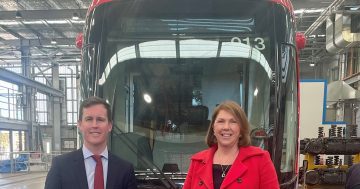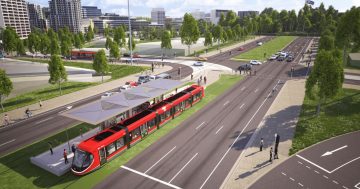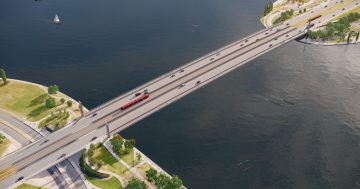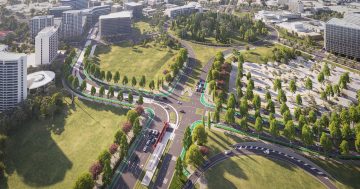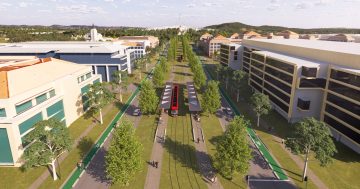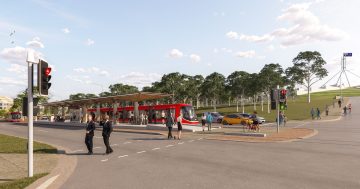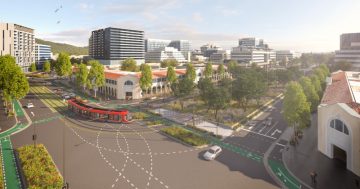
A render of Commonwealth Avenue North and light rail. The section north of the lake will be built as a stage in itself.
Light rail Stage 2 to Woden will be split into two sections with separate approval processes, in a bid to fast-track the up to $1.6 billion project that faces major engineering, environmental and heritage hurdles.
The ACT Government says that today it will lodge two referrals to the Commonwealth under the federal Environment Protection and Biodiversity Conservation (EPBC) Act for Stage 2A from Alinga Street to Commonwealth Park and Stage 2B from Commonwealth Park across Lake Burley Griffin to Woden via State Circle East.
Transport Minister Chris Steel said Stage 2B was a much more complex section than 2A, involving the lake crossing and extensive heritage issues through the Parliamentary Zone, and would likely need more time to be approved than the first leg.
He said the Government hoped that the relatively simpler first section, comprising three stations – Civic West, West Basin and Commonwealth Park, would allow for a faster approval and earlier construction start, possibly next year, so it at least could be up and running by 2023.

“We are aiming to ensure that complexities in the Commonwealth Park to Woden alignment can be worked through properly with the Commonwealth but without holding up work on the extension of light rail between the City and Commonwealth Park,” Mr Steel said.
Issues under the EPBC Act were expected to be limited for 2A and an Environmental Impact Statement (EIS) might not be required, although there were some biodiversity concerns around the golden sun moth, an endangered species. A works approval application will need to go to the National Capital Authority.
The hope was still that there would be passengers riding the entire length of the line by 2025.
Mr Steel said that 2B would require an EIS from the ACT and he expected the same from the Commonwealth, both of which would be open to public consultation before a formal works approval application was submitted to the NCA. It will also require approval from the Federal Parliament.
He said that completing the first leg would provide significant benefits by itself but the Government remained committed to the full extension to Woden.
The main issues from the Commonwealth’s point of view will be Commonwealth Avenue Bridge, the Weston tree plantings on Commonwealth Avenue and the vistas from Parliament House.
Mr Steel said the Government was not expecting any major changes to the suggested stop locations, which had come about from earlier consultation on the route.
The Government believes the Civic West stop on London Circuit near the ANU will be the most popular in the first section, with West Basin on Commonwealth Avenue serving proposed new developments there and Commonwealth Park, again on Commonwealth Avenue, being advantageous for major cultural events taking place in that area.
Stage 2B will have nine stops in Parkes, Barton, Forrest, Deakin, Curtin, Phillip and the Woden Town Centre.
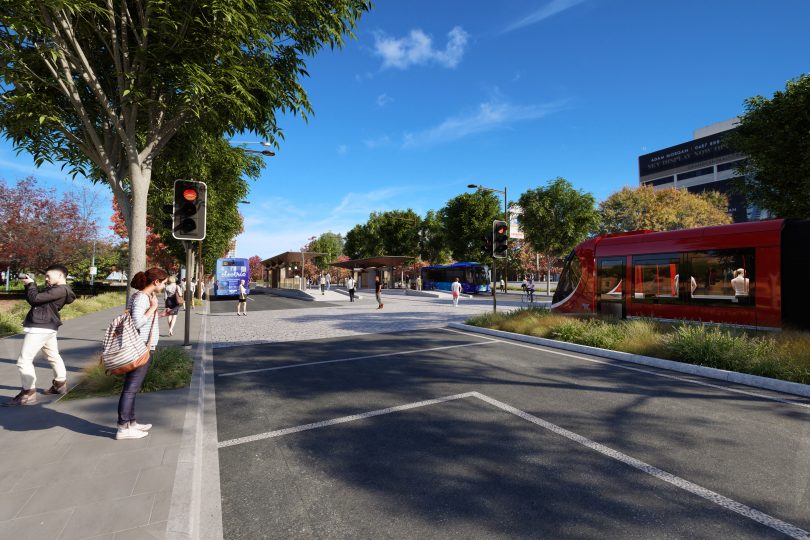
A render of the Woden Interchange light rail station in Callum Street.
The stops in the Parliamentary Zone will service the cultural institutions, public service departments and Parliament House with one stop also a short walk to Manuka Oval.
“We want to work constructively with the Commonwealth to work through these processes going forward and this certainly allows us to get started on Stage 1 in a much more timely way,” Mr Steel said.
He said the ACT would welcome a Commonwealth contribution for Stage 2 as occurred in Stage 1, and would continue to engage with the Morrison Government but the Territory was committed to going it alone if need be to Woden.
As in Stage 1, the business case will be looking at the urban renewal opportunities and potential land uses but Mr Steel said it was a very different route with development restraints along the way, and that most of the new development was expected to be in the city and town centre.
When complete, the Government will need to procure extra vehicles and have the existing fleet retrofitted for wire-free running on national land.












